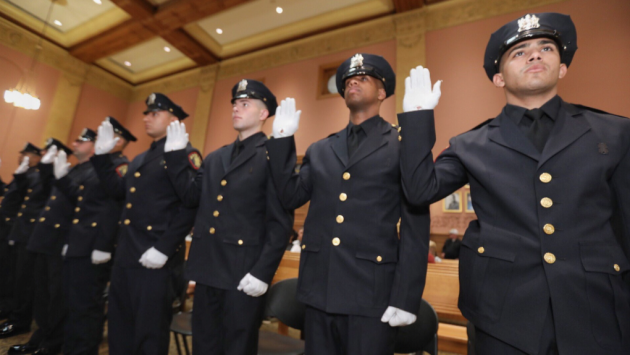The City of Jersey City will spend $1 million dollars on a dual-pronged, eight-month police de-escalation program that will focus on communication and approach strategies for hostile situations.

By John Heinis/Hudson County View
“Consistent with the Mayor’s Pledge I signed Day 1, we are making changes where necessary, from amending our Use of Force general orders to forming an ad-hoc review committee to now expanding de-escalation training,” Mayor Steven Fulop said in a statement.
“We are committed to providing our officers with the best possible training, and the expansion of this training to all officers will greatly benefit the community and meet the growing need for officers to hone their crisis management skills to proactively avoid dangerous situations in the future. We will continue to invest in our police department strategically to remain a national leader with regards to policing policy.”
The mayor first made mention of the de-escalation training in an email to municipal employees yesterday morning declaring Juneteenth a municipal holiday.
The seven-figure investment will repurpose funds recently redirected to the city for COVID-19 testing to expand tactical awareness and communications training currently implemented in the JCPD’s Emergency Service and Counterterrorism Units.
This training will now be mandatory for all uniformed members of the department to ensure maximum safety for officers and those they encounter in various demanding situations.
Furthermore, the de-escalation training will also be made available to residents and all others interested in observing the techniques being taught.
The first part of the program, verbal de-escalation and crisis communication, is taught by retired NYPD officer, Jack Cambria, who has conducted in-service training for international and federal enforcement agencies and will emulate best practices from cities around the world.
Cambria is also a retired Commanding Officer of the NYPD Hostage Negotiation Team.
The second portion, conducted by Tomahawk Strategic Solutions, utilizes interactive training to focus on strategies and approaches for police officers addressing hostile situations.
TSS is based out of Nashville, Tennessee and have played an integral role in planning active shooter drills in recent years at locations such as New Jersey City University and St. Peter’s Prep.
“We have a debt to our officers if we’re asking them to police in these difficult times, we owe them the best possible training we can provide,” stated Public Safety Director James Shea.
“Residents have requested this type of training out of regards to the public, and for the officers themselves. We have listened to their requests in an effort to further de-escalation efforts for all situations the JCPD encounters on a daily basis.”
The implementation of de-escalation training will further the Administration’s recent efforts to reassess the JCPD’s policies.
Council President Joyce Watterman introduced a resolution, which was approved last week, to form an ad-hoc committee with council and community members to review policing policies and procedures.
“Now is the time for us to focus on what we’re doing here in Jersey City and how we can make changes and improvements within our policies for everyone’s benefit,” added Watterman.
The courses will be implemented on a regular basis once the first round of training is completed by all officers from rookies up to the police chief.
The resolution to approve the vendor contract for de-escalation and other similar training will be presented to the city council at an upcoming meeting.
The JCPD filed 608 use-of-force reports in 2019, up 229 percent from 2018, as HCV first reported yesterday, though the administration chalked that increase up to new policies that necessitated reports being filed with more regularity.








